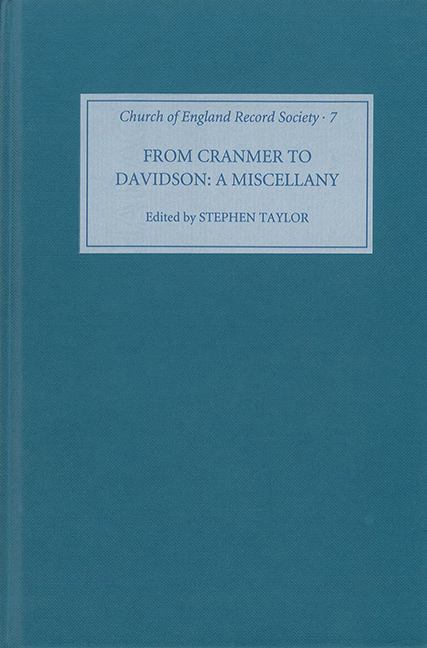Book contents
- Frontmatter
- Dedication
- Contents
- Preface
- Abbreviations
- 1 Thomas Cranmer and the Metropolitical Visitation of Canterbury Province 1533-1535
- 2 Edward Brocklesby: ‘The First Put Out of his Living for the Surplice’
- 3 Richard Montagu: ‘Concerning Recusancie of Communion with the Church of England’
- 4 Petitions for Episcopacy and the Book of Common Prayer on the Eve of the Civil war 1641-1642
- 5 Bishop Edmund Gibson's Proposals for Church Reform
- 6 Samuel Horsley: ‘Thoughts on Civil Government’
- 7 W. J. Conybeare: ‘Church Parties’
- 8 Randall Davidson: A Partial Retrospective
- Index
- Church of England Record Society: COUNCIL AND OFFICERS FOR THE YEAR 1998-99
8 - Randall Davidson: A Partial Retrospective
Published online by Cambridge University Press: 14 August 2020
- Frontmatter
- Dedication
- Contents
- Preface
- Abbreviations
- 1 Thomas Cranmer and the Metropolitical Visitation of Canterbury Province 1533-1535
- 2 Edward Brocklesby: ‘The First Put Out of his Living for the Surplice’
- 3 Richard Montagu: ‘Concerning Recusancie of Communion with the Church of England’
- 4 Petitions for Episcopacy and the Book of Common Prayer on the Eve of the Civil war 1641-1642
- 5 Bishop Edmund Gibson's Proposals for Church Reform
- 6 Samuel Horsley: ‘Thoughts on Civil Government’
- 7 W. J. Conybeare: ‘Church Parties’
- 8 Randall Davidson: A Partial Retrospective
- Index
- Church of England Record Society: COUNCIL AND OFFICERS FOR THE YEAR 1998-99
Summary
Introduction
Randall Davidson was born in 1848, the eldest son of Scottish presbyterian parents, and was educated at Harrow and at Trinity College, Oxford. He was confirmed in the Church of England at seventeen, and was ordained deacon in March 1874 and priest in February 1875. After three year's experience of parochial work at Dartford in Kent, he succeeded his friend, Craufurd Tait, as Archbishop Tait's resident chaplain in 1877. He married Edith, the archbishop's second daughter, the following year. At the age of thirty-five in 1883, he was appointed dean of Windsor and domestic chaplain to Queen Victoria. He was consecrated bishop of Rochester in 1891, translated to Winchester in 1895, and, at the age of fifty-four, in 1903 he was appointed archbishop of Canterbury. He died on 25 May 1930, just eighteen months after his resignation.
This brief curriculum vitae reveals only a partial picture of Davidson's progression to the primacy. His friendship with Craufurd Tait brought him to the notice of Archbishop Tait, and his position at Lambeth assured him an entrée into government and royal circles. His training at Lambeth and Windsor groomed him for higher preferment in the church. He belonged to the educated élite and enjoyed mixing with the ruling class, many of whom were his personal friends. He combined ambition with a certain humility and simplicity. He was self-assured, with a belief in his own judgment, particularly as it was tempered by experience and age. Yet without his personal commitment to a life of service to God and man, his espousal of traditional anglicanism, and his belief in the Church of England as the guardian of the country's moral well-being, he would not have been such an influential figure on the national scene during his primacy.
As a potential diarist, Davidson was well placed both at Lambeth and at court. Yet in April 1878, after being with Archbishop Tait for ten months ‘hearing & seeing a very great deal about everything that is going on', he had not been keeping any sort of systematic record for future use or reference. Ten years later, he was still berating himself for lack of constancy, but noted that ‘things do happen to me and around me which I ought to be recording and don't'.
- Type
- Chapter
- Information
- From Cranmer to DavidsonA Church of England Miscellany, pp. 387 - 438Publisher: Boydell & BrewerPrint publication year: 1999



